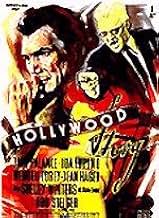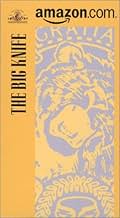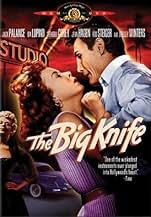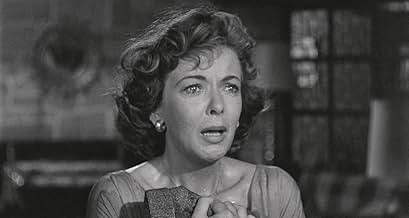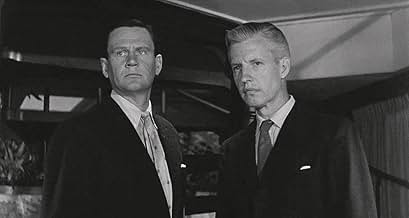VALUTAZIONE IMDb
6,8/10
4604
LA TUA VALUTAZIONE
Aggiungi una trama nella tua linguaHollywood actor Charles Castle is pressured by his studio boss into a criminal cover-up to protect his valuable career.Hollywood actor Charles Castle is pressured by his studio boss into a criminal cover-up to protect his valuable career.Hollywood actor Charles Castle is pressured by his studio boss into a criminal cover-up to protect his valuable career.
- Premi
- 1 vittoria e 2 candidature totali
Michael Winkelman
- Billy Castle
- (as Mike Winkelman)
Shelley Winters
- Dixie Evans
- (as Miss Shelley Winters)
Richard Boone
- Narrator
- (voce)
- (non citato nei titoli originali)
Nick Cravat
- Nick
- (non citato nei titoli originali)
Robert Emhardt
- Bit Part
- (non citato nei titoli originali)
Michael Fox
- Prize Fight Announcer
- (non citato nei titoli originali)
Paula Kyle
- Party Guest
- (non citato nei titoli originali)
Recensioni in evidenza
The Big Knife is a mostly good adaptation of a Clifford Odets play about a Hollywood actor who's being blackmailed into studio servitude while trying to patch up his failing marriage. This is a movie for which the word powerful was truly invented. Most of the film takes place on one set and places heavy emphasis on speeches from the individual characters for its really riveting moments (as I would expect from a stage play), but those moments definitely get across. The whole cast is good, but Jack Palance in a nuanced and fiery performance as the actor Charlie Castle, and Rod Steiger, giving a deeply felt and passionate realization of the corrupt studio boss are nothing short of superb. The screenplay is full of smart, incisive, biting dialogue as well. Except for a melodramatic turn at the end, that, for me, takes a lot of the edge off the story, this is a well-acted film that is solid, though not spectacular, entertainment. 3*** out of 4
Unless you understand that The Big Knife was Clifford Odets's one finger salute to Hollywood and its mores, you will not understand the film at all. Odets after some bad times in tinseltown went back to his first love which was the theater and wrote this play which ran for 109 performances in the 1949 season on Broadway.
In the lead roles of actor Charlie Castle and producer Marcus Hoff, Odets cast a couple of guys who were having difficulty finding employment in Hollywood at that time as well, kindred spirits from the Group Theater back in the day, John Garfield and J. Edward Bromberg. Garfield who certainly could bring his own life into the part plays Odets himself who had as tempestuous personal life as his creation Charlie Castle. He feels starved creatively because of the junk he's been doing in Hollywood, not the stuff of social significance that Odets did back Group Theater days.
Jack Palance plays Castle in the film and while he does justice to the part I only wish John Garfield had lived to do the screen version of what he created. He had an unceasing rebellion against Warner Brothers for the stereotypical tough guys parts he was being cast in. But just after he broke free came the blacklist.
Rod Steiger is malevolence itself as the producer whom I believe was based on Louis B. Mayer. Odets dealt with him through his then wife Luise Rainer over at MGM. Mayer was not liked even by his fellow studio moguls and he had been toppled in a studio power play at MGM a few years earlier. Had he still been in charge at MGM, I'm willing to bet The Big Knife might never have been made even as an independent film with a United Artists release.
Director Robert Aldrich filled out the rest of the cast with familiar Hollywood names like Ida Lupino as Palance's estranged wife, Everett Sloane as his long suffering agent, Wendell Corey in a role that has to be modeled on MGM's fixer who knew where all the bodies were buried Eddie Mannix, Shelley Winters as the bimbo like starlet who can put an end to Palance's career and Ilka Chase as a Hedda Hopper like columnist who is the self appointed keeper of the Hollywood morals. Chase's scenes are at the beginning of the film and she really has the columnist character dead on.
On stage the entire play is set in the living room of the Palance/Lupino Hollywood style mansion. Like the house in Long Day's Journey Into Night, the opulent living room becomes a character itself, showing the velvet and comfortable trap that Palance is in and why he just can't give up all this comfort, even for the art that used to motivate him.
Odets might have done better had someone else a little more dispassionate had written this based on his memoirs. The Big Knife gets a little too personal at times. And it never quite loses the stage origin even with a few scenes away from the house. But the acting his first rate from a first rate cast. I'd watch The Big Knife as a look into the mind of Clifford Odets.
In the lead roles of actor Charlie Castle and producer Marcus Hoff, Odets cast a couple of guys who were having difficulty finding employment in Hollywood at that time as well, kindred spirits from the Group Theater back in the day, John Garfield and J. Edward Bromberg. Garfield who certainly could bring his own life into the part plays Odets himself who had as tempestuous personal life as his creation Charlie Castle. He feels starved creatively because of the junk he's been doing in Hollywood, not the stuff of social significance that Odets did back Group Theater days.
Jack Palance plays Castle in the film and while he does justice to the part I only wish John Garfield had lived to do the screen version of what he created. He had an unceasing rebellion against Warner Brothers for the stereotypical tough guys parts he was being cast in. But just after he broke free came the blacklist.
Rod Steiger is malevolence itself as the producer whom I believe was based on Louis B. Mayer. Odets dealt with him through his then wife Luise Rainer over at MGM. Mayer was not liked even by his fellow studio moguls and he had been toppled in a studio power play at MGM a few years earlier. Had he still been in charge at MGM, I'm willing to bet The Big Knife might never have been made even as an independent film with a United Artists release.
Director Robert Aldrich filled out the rest of the cast with familiar Hollywood names like Ida Lupino as Palance's estranged wife, Everett Sloane as his long suffering agent, Wendell Corey in a role that has to be modeled on MGM's fixer who knew where all the bodies were buried Eddie Mannix, Shelley Winters as the bimbo like starlet who can put an end to Palance's career and Ilka Chase as a Hedda Hopper like columnist who is the self appointed keeper of the Hollywood morals. Chase's scenes are at the beginning of the film and she really has the columnist character dead on.
On stage the entire play is set in the living room of the Palance/Lupino Hollywood style mansion. Like the house in Long Day's Journey Into Night, the opulent living room becomes a character itself, showing the velvet and comfortable trap that Palance is in and why he just can't give up all this comfort, even for the art that used to motivate him.
Odets might have done better had someone else a little more dispassionate had written this based on his memoirs. The Big Knife gets a little too personal at times. And it never quite loses the stage origin even with a few scenes away from the house. But the acting his first rate from a first rate cast. I'd watch The Big Knife as a look into the mind of Clifford Odets.
This film is a thinly veiled discussion of various rumors about various big-name actors. Many times over the years, studio heads reportedly paid to bail big stars out of legal jams. And, while you can't prove exactly what happens, people talk and say that the studios paid people off and hid the crimes of its stars. A few examples of the cases which MAY have been covered up would include: Thomas Ince's death aboard William Randolph Hearst's yacht, the death of Jean Harlow's husband, the beating death of Ted Healy (recent stories say Wallace Beery was responsible) and MANY other scandals too numerous to list here. It's like "The Big Knife" is trying to expose these scandals without being too specific--otherwise the filmmakers could have either been sued or blackballed. This film is a lot grittier and cynical than other previous films that look at the dark side of Hollywood (such as "What Price Hollywood?" and "A Star is Born")--and I am pretty sure the studio execs breathed a deep sigh of relief when "The Big Knife" failed at the box office!
"The Big Knife" is not exactly what you'd expect given the film's title or that it's about a killing. You'd think it was an action film, but it isn't. In fact, the film is very non-action--with almost all of the film taking place in a guy's home--and often in just one or two rooms. The only action is when folks TALK about what has already happened or when the ego-centric main character shows his guests an old boxing film he made years earlier.
Jack Palance plays Charles Castle--a famous movie star who has been making a lot of movies which, in his and other people's opinions, are beneath him. He's bored with these sort of films and unhappy about the state of his life. However, his divorce and the crap that the studio forces him into are all his own doing. He cheated on his wife repeatedly and as for the studio, there comes the interesting part of the film. Apparently, years before, Castle was driving drunk and killed someone. But, the studio's 'fixers' came in and got a guy to take the blame--and allowed their money-maker, Castle, to keep on making films. So, when Castle pushes the execs for better films, their ultimate trump card is to expose Castle's guilt in killing someone! He's stuck. At times, the viewer might be inclined to feel a bit sorry for him--but throughout the film he keeps reminding the viewer that down deep, he is a jerk--as are most of the folks in this film. And, just how big an amoral jerk he might be is tested when a fixer (Wendell Corey) has to take care of one more loose end...and wants Castle's help.
For the most part, this is a very good film. Palance and the rest (particularly Corey) are very good. There is one exception, however. While Everett Sloane was a wonderful actor, here he is oddly miscast. Seeing him play an agent and saying 'darling' all the time to Palance just didn't seem believable in the least. They really needed someone oilier--someone who could just drip fake charm--though he WAS very good later in the film during his big scene (at about 90 minutes into the movie). I might have enjoyed seeing someone like, perhaps, Zachary Scott in this part--as he could ooze snake-like charm. Apart from this minor problem, the film delivers--with a resounding indictment on the sleazy dark side of the film industry. It also really helps that the film ended as well as it did--the finale is impressive. Well worth seeing provided you don't mind that the action is all on the cerebral side and not in the great outdoors.
"The Big Knife" is not exactly what you'd expect given the film's title or that it's about a killing. You'd think it was an action film, but it isn't. In fact, the film is very non-action--with almost all of the film taking place in a guy's home--and often in just one or two rooms. The only action is when folks TALK about what has already happened or when the ego-centric main character shows his guests an old boxing film he made years earlier.
Jack Palance plays Charles Castle--a famous movie star who has been making a lot of movies which, in his and other people's opinions, are beneath him. He's bored with these sort of films and unhappy about the state of his life. However, his divorce and the crap that the studio forces him into are all his own doing. He cheated on his wife repeatedly and as for the studio, there comes the interesting part of the film. Apparently, years before, Castle was driving drunk and killed someone. But, the studio's 'fixers' came in and got a guy to take the blame--and allowed their money-maker, Castle, to keep on making films. So, when Castle pushes the execs for better films, their ultimate trump card is to expose Castle's guilt in killing someone! He's stuck. At times, the viewer might be inclined to feel a bit sorry for him--but throughout the film he keeps reminding the viewer that down deep, he is a jerk--as are most of the folks in this film. And, just how big an amoral jerk he might be is tested when a fixer (Wendell Corey) has to take care of one more loose end...and wants Castle's help.
For the most part, this is a very good film. Palance and the rest (particularly Corey) are very good. There is one exception, however. While Everett Sloane was a wonderful actor, here he is oddly miscast. Seeing him play an agent and saying 'darling' all the time to Palance just didn't seem believable in the least. They really needed someone oilier--someone who could just drip fake charm--though he WAS very good later in the film during his big scene (at about 90 minutes into the movie). I might have enjoyed seeing someone like, perhaps, Zachary Scott in this part--as he could ooze snake-like charm. Apart from this minor problem, the film delivers--with a resounding indictment on the sleazy dark side of the film industry. It also really helps that the film ended as well as it did--the finale is impressive. Well worth seeing provided you don't mind that the action is all on the cerebral side and not in the great outdoors.
Too talky for some, too stage-bound for others, too strident for all, this is not a movie for everyone. Yet The Big Knife continues to fascinate at the same time it annoys. Maybe it's the savage depiction of Hollywood politics and the amoral glamour industry surrounding it. After all, neither blackmail nor murder is off-limits to ego-maniacal studio boss Stanley Hoff ( vintage Rod Steiger), while the human sharks swimming around him behave nothing like opening night at the Oscars. Maybe it's the sterling cast, featuring such 50's exotica as Steiger, Jack Palance, Wendell Corey, and Shelley Winters. In the end, of course, everyone gets to explode on screen except the ice cold Corey whose chronic bemusement proves ultimately more satanic than cynical. Whatever the reason, the result is an over-the-top cavalcade of unusual flair.
It's likely that producer-director Robert Aldrich targeted the film in behalf of blacklisted mentor Abraham Polonsky with whom he had collaborated on 1948's Force of Evil. After all, the year was 1955 and the all-powerful list could not be attacked directly, so what better vehicle than Clifford Odet's corrosive stage play adapted for all America to see. (Odets would do the same for Broadway in 1957's revealing Sweet Smell of Success.) It's fun to imagine how Aldrich's resulting indictment played in studio screening rooms where real reputations were at stake. Then too, much of the film's dirty laundry appears based on fact. The hit and run on Clark Gable's hushed-up 1933 episode; the Palance character on John Garfield's death at 39, listed officially as heart attack. It's hard to picture the producers ever believing such curdled fare would actually make money. Of course it didn't, angering many ticket-buyers with a title that seemed to imply real action instead of endless palaver. Still, this overheated exercise in shameless baroque remains an interesting oddity. A permanent record not only of individual styles, but of artistic protest amidst the throes of cultural repression.
It's likely that producer-director Robert Aldrich targeted the film in behalf of blacklisted mentor Abraham Polonsky with whom he had collaborated on 1948's Force of Evil. After all, the year was 1955 and the all-powerful list could not be attacked directly, so what better vehicle than Clifford Odet's corrosive stage play adapted for all America to see. (Odets would do the same for Broadway in 1957's revealing Sweet Smell of Success.) It's fun to imagine how Aldrich's resulting indictment played in studio screening rooms where real reputations were at stake. Then too, much of the film's dirty laundry appears based on fact. The hit and run on Clark Gable's hushed-up 1933 episode; the Palance character on John Garfield's death at 39, listed officially as heart attack. It's hard to picture the producers ever believing such curdled fare would actually make money. Of course it didn't, angering many ticket-buyers with a title that seemed to imply real action instead of endless palaver. Still, this overheated exercise in shameless baroque remains an interesting oddity. A permanent record not only of individual styles, but of artistic protest amidst the throes of cultural repression.
The Big Knife is not for everybody. Some will find it very literate, well-directed and acted(mostly), handling the tense and satire aspects deftly, while others will find it overdone. Both viewpoints are completely understandable, for me there were parts where the film did fall into the latter camp but most of the time it was the former.
As an adaptation of the stage play, which is very compelling and thought-provoking, it is very faithful and translates well adaptation-wise. As a film, it's far from perfect but it comes over well as a film.
There are a few things that don't come off quite as successfully as the rest of the film. Rod Steiger has a very ruthless character, but for my tastes Steiger plays the role too broadly to the point that Hoff felt more of a cartoonish caricature than a real person, to the extent that it came close to hurting the balance of the film and he didn't come over as very threatening. In his performance, there is a lot of camp and scenery-chewing, but not enough of the menace that the role so ruthlessly written needs. The ending does dissolve into contrived melodrama, which is where it is most understandable as to why some will find the film overdone, and felt rushed as well. Lastly, the film does feel over-scored in places, in the places where there is music the blaring music cues felt intrusive.
With the exception of Steiger, the performances are very good. Jack Palance's powerhouse lead performance is one of his best, while Ida Lupino is heart-wrenching and dignified. Wendall Corey wisely underplays and is very entertaining, and Everett Sloane, Jean Hagen(chilling in a role so different to hers in Singin' In the Rain) and a memorable Shelley Winters(in a performance that hits hard) do equally pleasingly. The script is remarkably literate and intelligent, with the tension being portrayed quite realistically and the satire being boldly lacerating. The story moves deliberately, but the tension present is enough to haunt the mind and the subject matter is a bold one and told in a biting, sometimes fun and poignant way. The Big Knife is photographed with class and atmosphere, the production values are appropriately claustrophobic and Robert Aldrich's direction is more than able, often excellent.
Overall, a very acquired taste, but for this viewer while not without flaws it was a well done film. 7/10 Bethany Cox
As an adaptation of the stage play, which is very compelling and thought-provoking, it is very faithful and translates well adaptation-wise. As a film, it's far from perfect but it comes over well as a film.
There are a few things that don't come off quite as successfully as the rest of the film. Rod Steiger has a very ruthless character, but for my tastes Steiger plays the role too broadly to the point that Hoff felt more of a cartoonish caricature than a real person, to the extent that it came close to hurting the balance of the film and he didn't come over as very threatening. In his performance, there is a lot of camp and scenery-chewing, but not enough of the menace that the role so ruthlessly written needs. The ending does dissolve into contrived melodrama, which is where it is most understandable as to why some will find the film overdone, and felt rushed as well. Lastly, the film does feel over-scored in places, in the places where there is music the blaring music cues felt intrusive.
With the exception of Steiger, the performances are very good. Jack Palance's powerhouse lead performance is one of his best, while Ida Lupino is heart-wrenching and dignified. Wendall Corey wisely underplays and is very entertaining, and Everett Sloane, Jean Hagen(chilling in a role so different to hers in Singin' In the Rain) and a memorable Shelley Winters(in a performance that hits hard) do equally pleasingly. The script is remarkably literate and intelligent, with the tension being portrayed quite realistically and the satire being boldly lacerating. The story moves deliberately, but the tension present is enough to haunt the mind and the subject matter is a bold one and told in a biting, sometimes fun and poignant way. The Big Knife is photographed with class and atmosphere, the production values are appropriately claustrophobic and Robert Aldrich's direction is more than able, often excellent.
Overall, a very acquired taste, but for this viewer while not without flaws it was a well done film. 7/10 Bethany Cox
Lo sapevi?
- QuizBecause of its vitriolic take on Tinseltown, this was unsurprisingly turned down by all the major studios in Hollywood. It eventually found a home at United Artists.
- BlooperThe camera and operator are visibly reflected in one scene in the living room.
- Citazioni
Smiley Coy: A woman with six martinis can ruin a city.
- Curiosità sui creditiIn the opening credits: Upholstered furniture by Martin/ Brattrud.
- ConnessioniFeatured in Les dossiers de l'écran: Les coulisses du cinéma (1970)
I più visti
Accedi per valutare e creare un elenco di titoli salvati per ottenere consigli personalizzati
- How long is The Big Knife?Powered by Alexa
Dettagli
Botteghino
- Budget
- 423.000 USD (previsto)
- Tempo di esecuzione1 ora 51 minuti
- Colore
- Proporzioni
- 1.85 : 1
Contribuisci a questa pagina
Suggerisci una modifica o aggiungi i contenuti mancanti

Divario superiore
By what name was Il grande coltello (1955) officially released in India in English?
Rispondi

